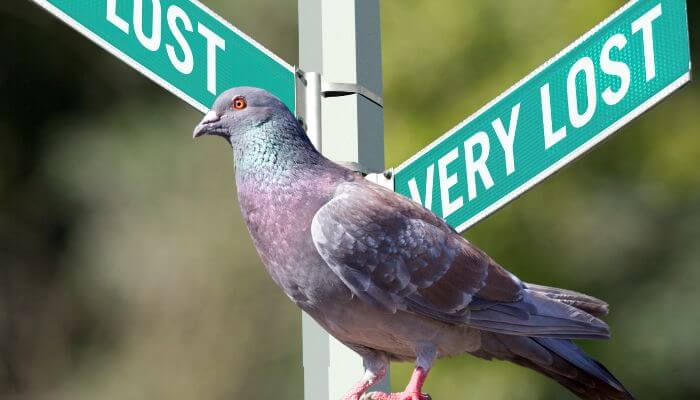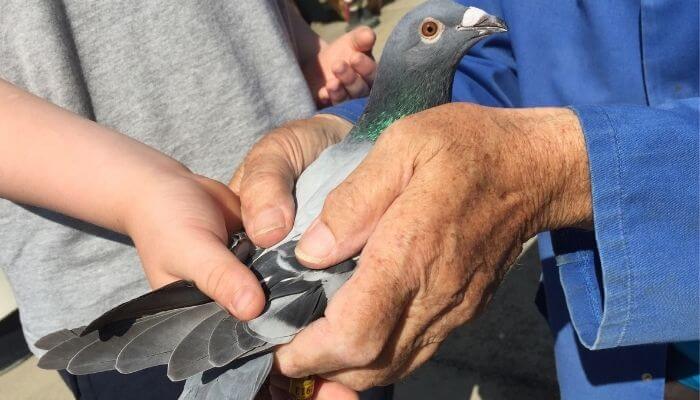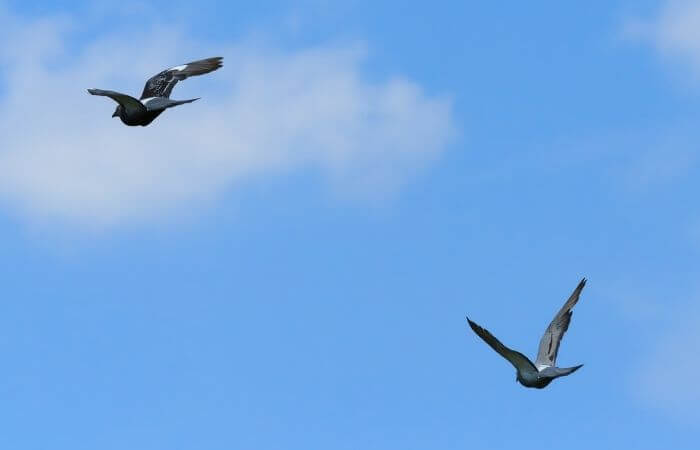Homing pigeons are amazing birds that have been bred for speed and their navigational abilities. A trained homing pigeon will return to its home loft even when released from a very distant location. They consider their loft to be a home for life and will even risk their lives to return to it.
However it’s not unheard of for homing pigeons to get lost.
For example, a British-based homing pigeon called Bob was discovered to have flown over 4000 miles off-course in 2022.

Some of the most impressive and famous pigeons in history have been homing pigeons who played important and essential parts in times of extreme necessity like war, but as with everything in life, things might not always go to plan.
The Story of Bob The Lost Homing Pigeon
A recent example of extreme misdirection occurred in 2022 when a British-based homing pigeon was discovered to have flown over 4000 miles off course, ending up bewildered and confused across the Atlantic Ocean in Alabama, the United States!
Bob the pigeon was feared dead by his owner Alan Todd of Gateshead, England, but he received an unexpected twist to the tale when a phone call was made to inform him that his pigeon’s microchip had been scanned in a completely different continent.
Sensibly, rather than sending Bob back on his steam, the pigeon was delivered back to Gateshead courtesy of a British Airways flight that was never going to lose its way!
What To Do When You Find A Lost Homing Pigeon
Domestic homers are usually fitted with a leg band that contains essential information about their home location. When discovered far from home, this information can be used to return the pigeon back to its owner.
A key sign of a lost, too far-traveled homing pigeon will usually be that the bird is showing signs of illness and/or weakness, and when in this condition they can rather easily be picked up using something like a bird net.
Most lost pigeons will likely be suffering from dehydration and lack of food, so as well as checking for their home information, you should help them by providing refreshments and rest space.

If you come across a pigeon that you believe might be a lost homer, then you can consider contacting your local pigeon club to come and collect the bird.
The national racing pigeon association in your home country will always advise you on the best way to deal with your found bird.
They can also advise what to do if you find an injured pigeon.
Take care if the pigeon has hidden itself in a space that you cannot easily maneuver in, as the risk of harming or further distressing the pigeon is not something that its worried owners will appreciate!
Leave the retrieval task in the hands of more experienced people and you can rest assured that you are doing the best thing possible in that situation.
So, in conclusion, the answer is very much yes, homing pigeons can and do get lost from time to time, but in most cases, there will be enough information on their microchips or leg bands to be able to get them back to their owners whether they are 4 miles off course or, as in the case of Bob, 4000 miles!
How Do Homing Pigeons Navigate?
When you consider the question of how far can homing pigeons fly and they still make their way home, it is incredible.
Originally, there were two theories of how a homing pigeon navigated its way home. These were that they used their sense of smell or they have some kind of internal compass that enables them to follow the earth’s magnetic lines and map mechanism. The compass relies upon the location of the sun, but the mapping ability remains something of a mystery!

Essentially, the compass system tells the pigeon in which direction it is headed but the mapping is its ability to know its location in relation to where it wants to go.
Geophysicist John Hagstrum wanted to understand what happened if something interfered with a pigeon’s sense of smell or ability to follow magnetic lines. He became interested in how and why pigeons became confused and misdirected in certain places around the world.
In these places, pigeons would not fly straight home but would scatter on random headings or repeatedly vanish in the wrong direction.
In 2013, he published his paper based on various studies. His theory is that the birds follow ultralow frequency sounds (infrasounds) to return home but experience disruptions in their ability to hear said sounds which disorientates them.
So while science settles on a theory, we can definitely say that pigeons get lost due to some interference in their ability to navigate.
A Matter of Distance
Distance does not play any part in a pigeon getting lost.
The single longest distance flight ever recorded by a homing pigeon was from Arras, France to (then) Saigon, Vietnam all the way back in 1931. This distance was 7200 miles and took a total of 24 days! (As stated in the Guinness Book of Records).

The conditions for going off course will be any of the theories expounded above so location is therefore not relevant.
As is the case with any domesticated animal that is let outside of its home confinement, there is always the chance that a homing pigeon can become lost out in the wild.
